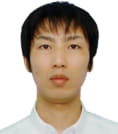- JST Home
- /
- Strategic Basic Research Programs
- /
 PRESTO
PRESTO- /
- project/
- Pioneering Research on Computing Frontiers/
- [Computing Frontiers] Year Started : 2019
[Computing Frontiers] Year Started : 2019
Michihiro Koibuchi
Codesign of Fault-Tolerant Parallel Computation and High-Speed Lossy Interconnection Networks
Researcher
Michihiro Koibuchi

Professor
Information Systems Architecture Science Research Division
National Institute of Informatics
Outline
As the miniaturization of semiconductor has already become a stalemate, it is difficult to continue to design lossless high performance communication hardware with reasonable costs. This study will provide a codesign method of parallel computation that has algorithm level fault tolerance, and high performance communication that provides minimal fault tolerant property. The codesign method will enable us to build a high performance cloud infrastructure for parallel computation.
Ayaka Sakata
Algorithm control theory based on macroscopic expression of trajectories
Researcher
Ayaka Sakata

Associate Professor
Department of Statistical Inference and Mathematics
The Institute of Statistical Mathematics
Outline
Statistical learning on complicated statistical models, which is a current trend in both science and engineering, requires algorithms that work with high reliability. The aim of this study is to develop algorithms that are flexible and robust against input data fluctuations. In general, the trajectories of algorithms are random variables with respect to data; hence the statistical property of trajectories should be understood to achieve robust computing. By introducing the macroscopic expression of trajectories, I attempt to extract typical properties of algorithms and quantify the reliability of these algorithms. Utilizing the quantified reliability, I attempt to establish theoretical backgrounds for the control of algorithms, to achieve a typical performance that suppresses instability caused by fluctuating data.
Ryuichi Sakamoto
Tightly Coupled Microservices using Emerging Devices
Researcher
Ryuichi Sakamoto

Associate Professor
Global Scientific Information and Computing Center
Tokyo Institute of Technology
Outline
Recently, it is important to improve modularity of web applications. This makes the web applications easier to develop, operate, and continuous deployment. For this reason, microservices are becoming famous. Microservices divide applications into multiple services. However, a problem of microservices is that the services are loosely coupled and execution efficiency is not good. Therefore, I propose a tightly coupled microservices platform which takes advantage of emerging devices such as NVM, FPGA and CCIX.
Satoshi Sunada
Photonic computing based on wave dynamics
Researcher
Satoshi Sunada

Professor
Institute of Science and Engineering
Kanazawa University
Outline
Our brain processes information with a huge number of neurons interacting with each other. The aim of this project is to implement high-dimensional dynamical features of neural networks into optical wave systems and develop novel photonic computing technologies based on the wave dynamics, which is potentially capable of accelerating intelligent processing with an energy-efficient way, toward next-generation AI edge computing.
kakumei Son
Real-time Low-power Innovative Learning-based Video Compression System
Researcher
kakumei Son

Junior researcher (Assistant professor)
Waseda Research Institute for Science and Engineering
Waseda University
Outline
To enhance the compression ratio of video coding, deep learning technology is adopted and it is expected to reach higher compression ratio than the video compression standard HEVC. However, current learning-based video coding (LVC) usually utilizes GPU for the acceleration which cannot meet real-time processing. To solve this problem, this project aims to develop a specific FPGA/ASIC hardware accelerator for LVC. By the optimizations from the aspects of both algorithm and architecture, this project aims at realizing a LVC system with high compression ratio, throughput and power efficiency.
Tsunaki Takahashi
Memristor Sensor Network for Chemical Information Processing
Researcher
Tsunaki Takahashi

PRESTO Researcher
Japan Science and Technology Agency
Outline
Long-term collection and processing of chemical data are strongly desired in the Internet of technology (IoT) era. In this work, we will demonstrate a device/system which extracts useful information from real-space chemical substances such as volatile organic compounds (VOCs) in a gas phase. Sensor network devices and measurement system will be developed. Towards a chemical information processing platform required in the Society 5.0, low-energy and real-time measurements/processing of chemical species will be demonstrated.
Olivia Chen
An ultra-low power neural network based on the co-development of algorithm, software and hardware
Researcher
Olivia Chen

Associate Professor
Faculty of Information technology
Department of Computer Science
Tokyo City University
Outline
The information data that accompanies the rapid development of artificial intelligence has increased explosively, which leads to enormous power consumption. In this research project, we introduce an ultimate solution for building an ultra-energy-efficient AI system that involves algorithm, software and hardware co-development, using an extreme energy-efficient superconducting technology. The developed AI system is capable of executing 1 trillion operations at 1 watt. Furthermore, we believe that the application of this technology will contribute to preventing global warming in the future.
Sadafumi Nishihara
Establishment of innovative molecular storage technology
Researcher
Sadafumi Nishihara

Professor
Graduate School of Advanced Science and Engineering
Hiroshima University
Outline
I am aiming to realize a petabit-class molecular memory using a single molecule electret that behaves as a ferroelectric in a single molecule. This ultra-high-density nonvolatile memory leading to computing revolution will contribute not only to information fields such as big data analytics and deep learning, but also to various fields such as space science, medical field, and robotics.
Teppei Matsui
Development of robust and efficient deep learning through biomimetics
Researcher
Teppei Matsui

Associate Professor
Faculty of Natural Science and Technology
Okayama University
Outline
Substitution of human labor by artificial intelligence is necessary for sustainable smart society. Although deep learning is a promising tool, it still has weaknesses such as vulnerability to noise and increasing computational cost. In this project, I will construct a new deep learning model that uses a cost function incorporating geometric information structure measured in the real brain activity. My goal is to develop a new method to tranlate the advantages of biological brains which was achieved thorugh evolution to computational techniques.













